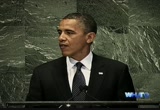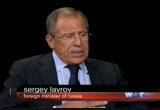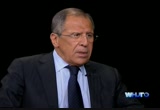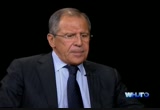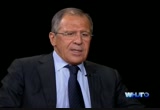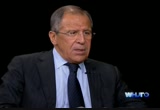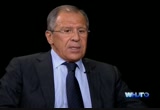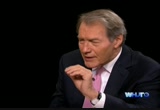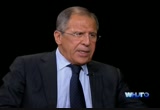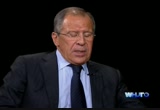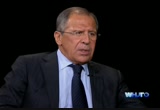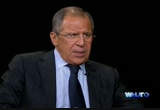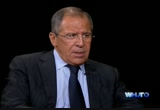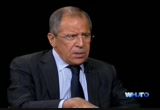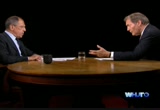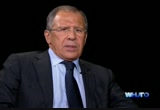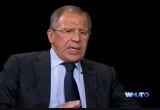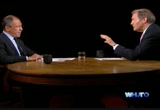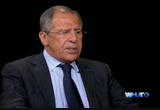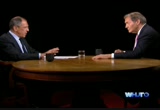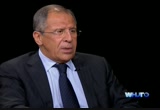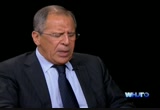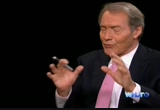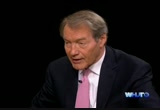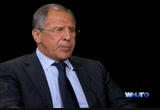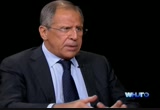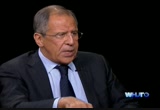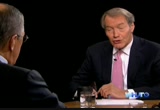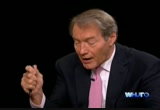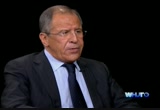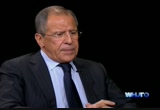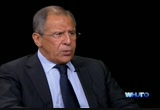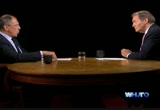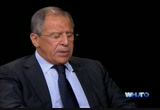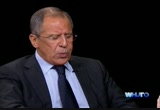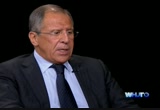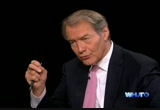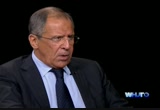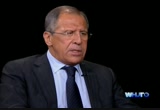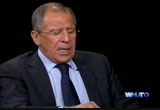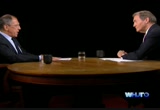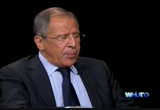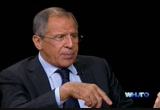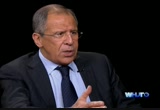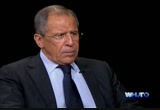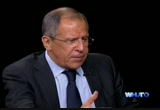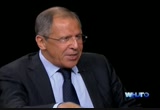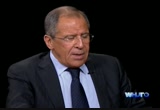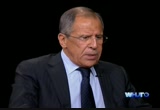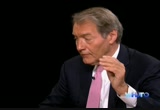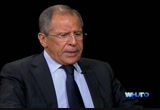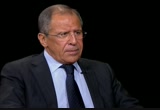tv Charlie Rose WHUT September 26, 2012 3:00am-4:00am EDT
3:00 am
>> rose: welcome to the program. tonight a conversation about russia and its foreign policy with the foreign minister, sergey lavrov. do you think you are on the wrong side of history. >> you can only judge when history evolves and we are now watching history in the making. when my good friend colin powell. >> rose: colin powell. >> was shaking this vial with some white powder in the security council, the americans were telling us unless we authorize the use of force against iraq, we would be on the
3:01 am
3:02 am
captioning sponsored by rose communications from our studios in new york city, this is charlie rose. >> rose: sergey lavrov is here, he has served as russia's foreign minister since 204. he is in new york for the united nations general assembly. the conflict in syria is an essential focus. president obama spoke about the issue earlier today. >> in syria, the future must not belong to a dictator who massacres his people. if there's a cause that cries
3:03 am
out for protest in the world today, peaceful protest. in a regime that tortures children and shoots rockets at apartment buildings. we must remain engaged to assure that what began with citizens demanding the rights does not end in the cycle of sectarian violence. together we must stand with those syrians who believe in a different vision, a syria that is united and inclusive where children don't need to fear their own government. and they have a say, sunni's and christians. that's what america stands for, that's what we will stand for sanctions and consequences to those who persecute and support for those who work for the common good. >> rose: they have the resolution to increase the government three times. meanwhile the killing in syria continues. they're up to 30,000 estimated dead. the impasse is just one of the many strains on relations between russia and the united
3:04 am
states. iran is another is the dis trust over nato's defense shield. earlier this month the u.s. agency of the international development to lead russia. i'm pleased to have sergey lavrov back at this table, welcome. >> thank you very much, nice to be back. >> rose: u.s.-russia relations. >> yes, i believe we agree that these relations should be promoted. when president obama came to the whitehouse, he and his team assessed the relationship between moscow and washington and suggested what they call the reset of those relations which we supported. and i believe that since then, we have been having understanding between us, between moscow and russia, that the really mutually beneficial partnership in the interest of the russian and american people in the interest of international
3:05 am
relations given the importance of the two countries can be based on equal, mutually respectful, mutually beneficial relationship. and on that route, we achieved quite a lot. i would be incomplete if i don't mention that there are problems, of course. you mentioned one of them, missile defense. we think this is a very critical issue in the relationship, having consequences for the global stability and strategic -- i recall it was the united states who suggested back in 1972 to sign the treaty which limited the missile defense deployment by the soviet union at that time and russia. it was all this decay considered by the military of both countries as being very important factor of the strategic stability. so removing this factor from the
3:06 am
overall balance is certainly going to have a destabilizing effect. we have been very frank and open in presenting our concerns. we do believe that if what we are hearing is true, namely that this is not against us, that there should be no reason why this assurance cannot become legally binding obligation. and we still have some time. we do believe, our experts believe on the basis of scientific analysis that at the latest stages of this four-phase approach, there would be risks for the russian -- and through that to the strategic stability in the global context. we still have time. it is not unlimited. but we are open for continuing the discussions and of course president putin conveyed this to
3:07 am
president obama. another area of irritation, i would say, is the civil society in russia. we're all in favor of civil society between the two countries, but on the basis which would not be tantamount to lecturing and indicating to domestic things as something which gives the united states the right to, you know, to pass
3:08 am
being accused of something which they never did, only for intentions. and intentions having been promoted by the f.b.i. agents. like it was the case in liberian who told -- missed the boot who was extradited from thailand in spite of the fact that the thai court ruled against extradition. >> rose: yes, he was an arms dealer. >> extra dated. >> rose: we're referring to the man who was accused of being an arms dealer. >> yes, that's exactly the
3:09 am
gentleman. and she was approached by undercover agents and she was provoked into giving his agreement, his intention to provide some transportation services. and they both got huge sentences while the people with the russian kids in the families adopted them basically get out without any real punishment. but having said this, i do believe that there are always problems between any two countries, especially such big countries as the united states and russian federation. and i would stand by quoting a statement by the russian foreign minister who was at that time they called, they were called chancellors mr. gorbachev the long else serving minister of
3:10 am
the russian empire who said once russia and the united states if only because of the geographical location are called upon to show natural solidarity of interest and have committed themselves. >> rose: all right much to talk about there. but let me talk about where there seems to be differences. there's much conversation obviously of this human session about syria. tell me exactly what you think so we can understand the differences between the u.s. government and the american government -- u.s. government and the russian government on syria. what is the circumstance on the ground today as you understand it? >> well, it's the civil war, it's a civil war with more and more international dimension.
3:11 am
because the countries who insist that before a dialogue can start, president assad must go. they do not have the support for the rebels. the presyrian army which has been dominated by the muslim brotherhood is not the only group who is fighting the government. the elements associated with al-qaeda, the other terrorists groups also present. this is an all out civil war with increasing international component as i said. and it's, it's terrible. >> rose: what's the russian, okay, is it a stalemate now? do you think the rebels are winning because they seem to from a distance seem to be
3:12 am
gaining territory. >> depends on to who you listen. information from the government, i don't have any objective independent source of giving any assessment of the military situation. we are concerned more not with who is winning but with how to stop it. >> rose: what do you suggest the world do to stop it? >> well, we suggest to do what we all agreed to do in geneva on the 30th of june when the initiative of -- supported by us, there was a meeting, ministerial meeting with five dominant members of the security council, arab league in the person of secretary-general, prime minister of qatar, minister of kuwait, as well as foreign minister of turkey, the european union and the person of -- and the united nations secretary-general. and we spent some eight
3:13 am
agonizing hours on that saturday, and we produced a document called geneva community by consensus. and we believe that this was a very fair compromise between the key outside players, which should be i pressed and imposed upon the parties. we then received a positive response from the assad government. this communicate among other things asked the government and their position to appoint interlockers to start a dialogue on the composition of transitional governing body. the body which would be empowered to prepare elections and the new constitution. and the government appointed such interlocutory, that position didn't do the same, they rejected the document altogether. this was, as i said, the
3:14 am
consensus on the political part of the crises which by al-awlaki outside players. later we suggested to endorse these documents and the security council and our partners refused to the it. >> rose: what happened with mr. assad on this document. >> under this dump, the government and their position must appoint interlocutories and to discussion on the basis of agreement who would be part of the transitional governing body. this body would have full authority in the country. and would be in charge, you know, to prepare the new constitutional draft to be put referendum and to prepare for free and fair elections. >> rose: do you think it's unreasonable to ask president assad after all the killing by the government about the syrians to step down? >> well, it's something which people say. and we have a choice.
3:15 am
we have put as number one priority, immediate secession of the bloodshed. and by that, try to save as many lives as possible. which is our position. and which is, by the way, reflected in the geneva communique. the alternative is to say unless and until she steps down, we will encourage their position to continue the fighting. and this option, i believe it doesn't require any explanation. this option means that for the purpose of removing president assad, those who choose this option are prepared to pay the price in human lives, in human lives of the syrian people.
3:16 am
>> rose: you depend on them rather than on the lives of the syrian people. >> no, charlie i don't try to put the blame on anyone. i present the factual situation. if we all say the bloodshed must stop, and if this is our predominant goal, then everyone from outside who have any influence on any of the syrian party must in a synchronized manner lean on all of them and tell them stop fighting and then sit down and discuss what the future of the country would like to see. >> rose: you're saying the conversation between the assad and his choices and the rebels and their choices. >> no, i'm saying that if we have number one priority to save human lives, then this is the way, this is the shortcut. if the priority number one is to remove president assad like it
3:17 am
was the priority number one to remove milosivich. >> rose: qaddafi in libya. >> then of course people should understand this would be slightly difference from saving lives immediately. >> rose: all the example you just showed, do you think they are bad precedents, whether it was milosovich or sadaam husain. were they somebody russia disagreed with on each count. >> we disagreed with any use of force which was not authorized by the security council. >> rose: it is said that your government and you are, were very much upset by what happened in libya in terms of the united kingdom, with the security council authorized and what the french government did, that that
3:18 am
somehow offended you, that that colors your impression of what you're prepared to do in syria. >> that's not the right word -- >> rose: choose the right word. >> -- to describe it. no one likes when people cheat. when it relates to international issues of huge importance involving hundreds and thousands of human lives the cheating is heavier price. >> rose: what's the cheating. >> the cheating was on the no fly zone. the no fly zone, this notion when it was first introduced during the iraqi crises, the explanation given at that time was that the no fly zone means that saddam hussein doesn't have the right to move his air force and any other aircraft, and that be iraqi air space would be
3:19 am
patrolled by the coalition which was which was authorized by the security council, and that the only case who when the fire could be open was when sadaam hussein flies his plane or the iraqi air space is by the raider. what was the case in libya, i don't think i need to recall. we have not been, and of course another cheating was on the arms embargo resolution which was adopted by consensus. we didn't abstain, we voted for it, only to see that you know later the countries like france and cause -- qatar by the way were opening bragging that they were supplying arms to the rebels in violation of the security council resolution. i wanted to make one thing very clear. we were not wedded to
3:20 am
mr. qaddafi or to mr. -- he was not educated in the russian federation, he was educated in europe. his friends were in western europe, not in russia. and when people say that you are protecting president assad, this is absolute ignorance of the real situation. >> rose: i believe you're protecting him, and why am i ignorant if -- >> wait charley, tell me in what way i was protecting him. >> rose: in several ways. most people believe that if they did not have russian support and iranian support, he would not last very long. both in terms of arms and in the iranian case, some suggest more than that. without iranian support and russian support, most people believe that president assad would be out of syria in a shorter time than otherwise he might last. >> that's the power of the
3:21 am
media. the media covering the hearing crises, in most creases, and politicians by the way when they address the public through the media, thinking, i believe, not only about the future of syria but also the domestic political positioning, they speak in very straightforward and simple, if not to say simplistic -- assad is the butcher, he belongs to the tribunal, assad is a criminal. he has no place in syria or anywhere on earth. and this of course penetrates the minds of the audience. >> rose: do you believe none of that's true. >> well i believe that we have to see the picture in its entirety. assad is responsible for many things. he's the most responsible person for the crises which we have in syria. he has made a lot of mistakes, ignoring good advice given to
3:22 am
him by the countries of the region, by russia, by china, by many others. he has been doing too little too late, and we're not writing this off. but we can not make an impression. we cannot pretend that he is fighting every day unarmed people. the armed position started i think in may 2011, and there was still time, you know, to deal. and we have been calling upon him and upon their position because we are meeting with all the position groups. not only outside syria but with those who are opposition inside syria. and we have been pushing them in the same direction. but when we tell our opposition partners, syrian opposition representatives that we believe that you should forget now
3:23 am
about, you know, who is more important in the position movement, should forget about your personal hatred, why don't you think about the people, why don't you stop fighting. they have been telling us in response, but you know other foreign partners of us give us different advice. they tell us keep fighting until the end. raise your voice saying that russia must and you will prevail. tell me when people say, by the way on the issue of arms, we have fulfilled the conference signed long ago. some of them related to the services of the agreement sold to syria by the soviet union. >> rose: no arms, they were not part of an old contract, is that what you're saying. >> no. and we have not signed any new
3:24 am
contract since this crises happened. i cannot speak for iran, of course. there are some reports which have to be looked into, but i can only speak for russia. and when people say that if only russia and china could support a chapter 7 resolution, i asked my colleagues what, how do they see the implementation of this resolution. and do you know what some of them told me? well why don't we introduce arms embargo and sanctions. sanctions and arms embargo have already been introduced by the united states, by the european union, by a number of other countries, including the countries of the persian gulf, the arab league. this went without even informing us, not to mention consulting with us. they were introduced bypassing the security council long before
3:25 am
those resolutions were proposed for a vote. but imagine, there is a chapter 7 resolution adopted. let's hypothetically imagine this situation. and there is no answer, what will be the difference. some of them talk between, talk with each other and we happen to know what they say. and one of them, one idea is any reference to chapter 7 would be enough to stop outside interference. >> rose: i've got to go to this point because -- >> please. >> rose: -- most of the world it seems to me and you can say i simply am wrong believe that assad should go. believe that the atrocities on behalf of his government has gone beyond the pale pale, that they have been so egregious in terms of what he has done and people fighting for him has done that he has to step down before
3:26 am
you can find any look at the future of syria. and that russia and the other countries in the region, whether it's turkey, iran, there are various suggestions ought to be involved in looking at the future of syria. you obviously are concerned about the future of syria, it's been a friend of russia's and you're concerned about who might be part of a new government. and who makes up that kind of government. that's one question. but the other question is for someone who had committed the kinds of actions that assad has, to say he can remain in power until we find some negotiated agreement to stop the violence, it seems unacceptable to most other nations. and every leader that i talked to wants to see him go except president ahmadinejad who i interviewed yesterday and the russian government. how many people support your position on assad? >> you know, this is not about
3:27 am
being part of the crowd. this is about -- >> rose: fair enough. >> this is about our convictions. there are atrocities, there are war crimes in syria. >> rose: war crimes. >> war crimes in syria and atrocities. and this has been documented and reported by the un human rights commissions, human rights council and independent commission which presented its report recently to the security council and which has both the government and their position a duty. >> rose: i don't think they are at equal guilt at that case. >> i did not say that they mentioned equal guilt, i only said what i said charlie that both governments and their position have been engaged in atrocities and something which can be described as war crimes. we are not -- we don't want, you
3:28 am
know, to say that this is a person who can lead the new syria. >> rose: do you believe he can lead a new sear -- syria, o you believe that. >> you said it's important for us who would be leading syria. personalities are not important. which is important for us is not to allow this crises. generate into the sectarian war, because there were all indications that this is a very probable scenario. what is important for us, that all those who live in syria and to whom president obama alluded in his speech to the general assembly, the sunni's, the shia's, christians, kurds all they know their rights, the security, the economic political social rights would be respected in the country.
3:29 am
>> rose: most people believe that. does anybody not believe that, that those political rights ought to be respected? and that -- >> this is important for us. >> rose: okay. >> this is much more important than the hunt for the head of a single person. the dialogue between the position and the government which the geneva communique endorsed provided for interlocutories to be appointed and that position would have a veto on the composition of the transitional governing body. and that's as simple as that. >> rose: how do you think this situation, this terrible killing taking place in the country, syrians against searians, other groups have come in. >> not to count mercenaries. >> rose: exactly, they've come in. nobody questioned whether it's al-qaeda. >> they would not be part of the dialogue. >> rose: fair enough and i think most people believe that. and there's some concern
3:30 am
obviously in other arab countries in other parts of the world include the west about who has taken advantage of this situation and what role they might play in the future. >> not us. >> rose: that's a concern shared by many people, yes? >> not us. >> rose: not us meaning what? >> meaning not us who are benefiting from the situation. you said who is benefiting from the situation. >> rose: i was just trying to make the point there were a lot of groups that are there and come in. everybody recognizes they've come in and it's a concern for many people. and you just expressed the same concern, did you not? >> yes, i did. >> rose: so i mean, do you believe that assad would stay in power and would fight a long drawn out civil war if it did not have the support of russia? >> look, first before answering this question, i really want, i sincerely want to understand what do you mean by support from russia. >> rose: you tell me. >> that we say we're not going
3:31 am
to endorse a security council resolution, which is demanding a unilateral capitulation of the regime? yes. we cannot let this resolution pass because this is absolutely unrealistic, and this would only invite outside intervention. >> rose: when is it when a regime is so committing war crimes and so morally offensive to any civil society that everything has to be done that's possible to support those in opposition, and to change the government that is committing. when would you suggest that's an appropriate action? to change a government. >> i don't think we can visualize such a situation. >> rose: there's no situation you can imagine. >> there is one very straightforward example. there was several terrorists attacks against the syrian government.
3:32 am
not only against the security headquarters but also against absolutely civilian sites, social infrastructure, health infrastructure and a couple times the security council, like it always does after various attacks, a couple times the security council condemned those terrorists attacks. as of a few months ago, our colleagues including the united states delegation, the security council started refusing to condemn terrorists attacks against the syrian government and administrative sites. the reason given to us was that exactly what you said. the regime is absolutely inhuman, and basically anything goes. this is a very scary position,
3:33 am
to justify terrorist attacks by anything was never acceptable to the united states, to the western general, to russia, to all other civilized countries. i believe this is a very sliply slope. >> rose: i hear you and you made that very clear and make that case from your own perspective. when you sat down with me, and we've known each other for a long time, you said that this has become much more than syria. what did you man? >> well it means that -- >> rose: i heard something like, i'm not sure, a clash of civilizations. >> to some extent yes. and also to some extent what the world order is going to be. whether we are going to respect the united nations chapter or it would be a free for all. when people say that it is acceptable that russia and china used the veto power and that lets bypass the united nations,
3:34 am
the security council is in a stalemate, it's unbearable. let me remind you that the veto is part of the united nations chapter, it's part of the international law embodied in its most important instrument. and the veto right for the members of the security council was the proposal of the united states of america, in san francisco conference. and the americans refused to create a united nations organizations without this provision. so veto is part of international law. the founding fathers of the united nations -- >> rose: i understand, i understand. >> -- agreed that unless the five government members see eye to eye, the decisions would not be workable. >> rose: i agree with that. but i mean, i am also asking, do you ever consider the fact that
3:35 am
in this case you are very much on the wrong side of history. >> well you can only judge when history evolves. and we're no watching history in the making. when my good friend colin powell. >> rose: colin powell. >> was shaking this vial with some white powder in the security council, the americans were telling us, unless we authorize the use of force against iraq, we would be on the wrong part of history. and it turned out to be that there was no anthrax in that vial. >> rose: okay. that's a very good point and i'm glad you made that because one great concern of people because of the nature of this conflict is that there are chemical weapons in there which is of great concern to the surrounding countries, for the unites. >> sure. >> rose: and what might happen to them? do you have that concern? >> yes, we do have this concern.
3:36 am
>> rose: what are you prepared to do about it. >> we conveyed this concern to the syrian government. we helped, i hope i'm not revealing any big secrets. we held the american experts to get in touch with the syrians on this particular point and we received the explanations and assurances that the syrian government is protecting those sites the best possible way. it depends on the syrian government, i think we have checked through the means available to us, and we can say that for the time being it is safe. >> rose: for the time being. >> the biggest risk for this chemical weapons to get into the wrong hands is if they are if the sites are taken by al-qaeda and the like. and maybe even by the parts of
3:37 am
the free syrian army because they have been openly calling for al-qaeda to coordinate with them. >> rose: that is the worry of a lot of people. what's russia prepared to do if it looks like they may fall into those hands. >> so far we don't have this information. i prefer not to guess. this is too serious a matter. we have been and continue to watch it very closely. and this is something in which we regularly exchange our assessments with our partners in other countries. >> rose: if president assad should change his mind about his possibility of survival and he looks at what's happened in the middle east and says it's time for me to go. >> that would be his decision. >> rose: if he makes that decision, will russia help him go? >> you mean whether we receive him? >> rose: yes. would you help him go, provide security for him to go and even
3:38 am
offer him asylum. >> no, we would not offer him asylum. as i said, he was friends with some other countries to the north, to the north west of syria. and this is up to those who threatened him with possible punishments. but we would not be telling him to go. not because we believe that he's indispensable, not at all. for us, it does not matter who can rule syria as long as syria is democratic free and comfortable for all minorities. but he would not go until and unless he decides for himself. >> rose: right. >> and that's as simple as that. >> rose: you won't help him and you won't provide a place for him to go. >> if people believe that by cornering him to achieve this
3:39 am
purpose, then this is their judgment. so far it looks that like cornering him they make him more and more persistent in fighting until the end. >> rose: until the end. >> and we are back to the notion of how many lives you can save by one option or by another option. >> rose: let me turn to iran while you're here. do you believe that the iranians want to have a nuclear capacity? do you believe they should? and if they do, what should happen? >> well, i know one thing for sure, that iranians wanted to have full nuclear fuel cycle, which is absolutely in line with non-proliferation which is not prohibited. from the full nuclear fuel cycle, it's not too far to
3:40 am
weapon grade enrichment of you're -- ukraine number. >> rose: it's to have a political position, is it not. >> like i said they do not hide. they make it public and they know this, that they want to have full nuclear fuel cycle which is allowed and which is absolutely legal under the non-proliferation. >> rose: you think they want enough ukraine number so they can make a nuclear grade weapon if in fact, if in fact they have enriched fuel and they can and have the technology and the means to do it but have not done it. >> as i said, let me finish, continue. from this stage of having full nuclear fuel cycle technology, to the stage of producing weapon
3:41 am
grade uranium, there is not a very long road. i'm not an expert, i don't know how long it is but probably a year or so, maybe more. but there is no indication that iran has taken a political decision to do this. and there is no indication that they started doing this. and the american information which is made public by mr. panetta every now and then is the same. the assessment is there is no political decision in iran. so if people believe that the more you provoke iran, the sooner iran would take the decision, then i think that this is a very dangerous path. where categorically against violation against the non-proliferation regime. against iran or any other country gets in nuclear, but to get there to this goal of
3:42 am
non-proliferation of nuclear weapons, we all need to rely on reasonable approaches. because if isolation is the slogan of the day, more and more sanctions, threats to boomerang and got forbid, if this happens, what will suffer immediately is cooperation between iran and international atomic energy agency which for the time being is monitoring the control, all the cleared nuclear sites in iran which for the time being reports that they did not discover any indications that iran has any military. they mention in the nuclear program. which of course also reports that it cannot make the 100% guarantee statement that iran does not have something which they don't know, and that's exactly what we believe must be
3:43 am
the focus of international efforts. make sure that iran satisfies the agency with the agencies still have vis-a-vis the nuclear program. >> rose: do you believe that so far that the iranian government in terms of the iaea has been transparent and has been forth coming and has done everything they can to prove to them that it has no intent. >> as far as the nuclear sites are concerned, as far as iran legal obligations under non-proliferation are concerned, iran is cooperating with the agency and the agency confirms this in its reports. iran is not a regular member because there was a hidden program which was discovered sometime ago and which is the subject of the agency work in iran to clarify exactly what
3:44 am
you're asking, charlie, whether there is something, the agency does not know, which might relate to iranian plans to have military they mention in their nuclear program. there is a list of questions formulated by the agency and it is the position of the five plus one -- that iran must satisfy the agency on those issues. but my point is that by threatening and sanctioning again and again, we're not making iran more cooperative. iranians, whenever -- >> rose: how would you change -- >> you don't change iran, you change the favor of everybody. because if you stick to the threats and sanctions and we go to iran and say you must cooperate with the agency because if you close all these issues, this is what five plus one told you. when you satisfy everyone through the agency that you
3:45 am
don't have any military dimension in your nuclear program, you would enjoy the rights of any member. but in response to this, that's important charlie about the persuasion. iran told us, look we don't believe that the west would ever deliver on this deal, which the west itself proposed to us. we believe the west is about the regime change, that this permanent sanctions which have been tighter and tighter, and by the way sanctions are becoming exteller touching upon the interests of those companies implementing the security council resolutions but do not implement unilateral sanctions. show iran is convinceds, at least they tell us maybe they have some other thoughts but what they tell us is that the west is not sincere. they are against our regime. and of course, of course
3:46 am
iranians are making very, i would say, unacceptable statements about israel. >> rose: just unacceptable? they want to wipe them off the face of the earth. that's unacceptable. >> yes. >> rose: let me ask you this. >> but my point is to with iran, if we want to resume the issue, you really have to i'm gauge iran. like we must engage iran on syria. and i fully support the initiative of president mosi. >> rose: he was on the program last night that he wants to see -- >> isolate iran, whether we want to invite iran to geneva to this action group meeting. americans said no we cannot deal with iran but with all respect. when americans needed iranian assistance on computer situation
3:47 am
in iraq, the americans did not hesitate to sit down and deal with iranians. so i believe that the security situation of syria is no less important and no less dangerous than the one which prevailed in iraq at that time. iran must be engaged. iran has its own legitimate security. >> rose: don't you believe that the president of the united states, i mean part of what he tried to do at the beginning of his administration, this president was to engage iran. >> yes. and we supported. >> rose: and he was not successful. >> it was not, and we said to iranians that this was a mistake. we believe that this should have been grabbed, but we still have the common position of the five plus one. >> rose: let me ask you this too. this is sort of the heart of it i think, it is that while you and your government and most government do not believe, would not like to see iran have nuclear weapons. said that here at this table.
3:48 am
>> to put it very mildly. >> rose: exactly. you think would be a great threat. >> well, we think any violation of any treaty would be a great threat. >> rose: do you have any worry that because of the way they've been able to delay and hide and some of those things, that they may be getting very close, so close that at some point it might be too late. you at least have that concern or fear because of your just expressed motion it would be terrible for them to have. >> well we have, we have concern that iranian nuclear program might have a military dimension because the iaea presented to them several questions which remain unanswered for quite considerable period of time. and we will insist on this and we did again a very strong statement in the form of the
3:49 am
resolution of the governing board of the international atomic agency sponsored by all six countries who participated in this dialogue with iran. we also believe that iran would be much more forthcoming if it knows that we are not cheating on iran when we say that you fulfill demands and you will be equal and you know full member of mpt enjoying all the rights. >> rose: if in fact the president of iran had made the kind of threats against russia that he had made against israel, wouldn't you be enormously concerned as the israelis are. >> we're already concerned with his statements vis-a-vis israel and we tell them, we tell the irons direct -- the iranians directly that we absolutely disapprove of this.
3:50 am
>> rose: they continue to do it so obviously they are not listening. >> they're not listening, they're not listening but this does not mean that we have, that we can't forget about the predominant goal in all this exercise. to make sure that iran does not have any dimension which is military in its nuclear program. like in korean peninsula, the predominant goal is the nuclear rights in the peninsula. and by the way north korea dropped from mpt. north korea exploded a couple times nuclear devices and said it will continue to do so. and you know, it sends a message to some other countries who are concerned about their security. that if you have a bomb, you are safer, and this is a very
3:51 am
dangerous situation. so we really have to be consistent in what we do, whether in promoting democratic revolutions from the middle east or whether to safeguard the non-proliferation regime or whether resolving any other conflict. we cannot approach things just because of the domestic political agenda using double standards. >> rose: do you have fears about the arab spring? >> well i think -- >> rose: do you have any theories about the arab autumn and where you think it's going. >> i hope it's not going to the nuclear winter. >> rose: what would lead it to the nuclear winter, iran getting a nuclear weapon which is not an arab country. what would lead to the nuclear winter? >> well, this was a figure of speech, of course. >> rose: okay. >> nuclear winter -- >> you take it very seriously that more and more countries are thinking of buying security guarantees by way of going
3:52 am
nuclear. it's very dangerous thing. and threats, isolations, policies. they only fueled this concerns. and we have really to think about the overall security landscape, not only in the middle east, in many other parts of the world. and when this most important global issues which will, you know, have consequences for many of us, are becoming hostages to one or other political campaign, it's really very sad. >> rose: i hope we can continue this dialogue because i think it's important. you're very busy. i thank you whenever you come by. what's interesting is your expressions of you have said to
3:53 am
the iranians about israel and therefore one would hope that there would be more of a possibility for the united states and russia and china to be on the same page. because the issues that you have talked about are of that magnitude that it demands that kind of thing. not only that but also regional powers in any of the places that are theory -- >> well, thank you very much. and i do believe that we have to think about the common response to common threats. we have to think about countering terrorism, nuclear proliferation, proliferation of weapons of nuclear destruction and counterterrorism which is
3:54 am
growing and fueling terrorists activities. i believe that probably the single most important contribution to countering this extremist trends is the resolution of the palestinian issue. unfortunately because of all this vivid pictures of the arab spring and the arab summer and now arab autumn, the palestinin issue is put to -- if not even farther. this is wrong. we have to understand that extremists recruit young people using as one of the arguments. >> rose: i agree. >> the palestinian tragedy. >> rose: you have just said clearly there are a lot of governments that are concerned there has been no progr of the relationship between israel and the palestinians, i ray lisa and the palestinians. on the other hand, there are
3:55 am
others that would argue based on what you just said that there might very well be extremism even if they settled the israeli and palestinian conflict. that's not the only reason that drives extremism in the world today. >> well these days, yes. but some time ago it was almost the single reason. but now it is much more complex, i agree. >> rose: thank you. a pleasure. >> thank you very much, as always. >> rose: sergey lavrov, foreign minister of russia. thank you for joining us. see you next time. captioning sponsored by rose communications
88 Views
IN COLLECTIONS
WHUT (Howard University Television) Television Archive
Television Archive  Television Archive News Search Service
Television Archive News Search Service  The Chin Grimes TV News Archive
The Chin Grimes TV News Archive 
Uploaded by TV Archive on

 Live Music Archive
Live Music Archive Librivox Free Audio
Librivox Free Audio Metropolitan Museum
Metropolitan Museum Cleveland Museum of Art
Cleveland Museum of Art Internet Arcade
Internet Arcade Console Living Room
Console Living Room Books to Borrow
Books to Borrow Open Library
Open Library TV News
TV News Understanding 9/11
Understanding 9/11


